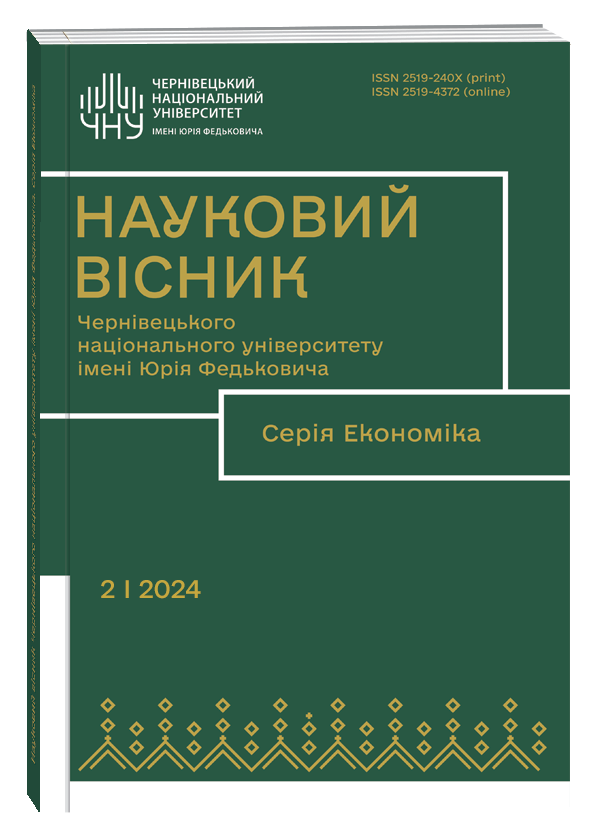ARTIFICIAL INTELLIGENCE AS A TOOL FOR MANAGING HUMAN RESOURCES IN CONDITIONS OF UNCERTAINTY
DOI:
https://doi.org/10.32782/ecovis/2024-2-5Keywords:
artificial intelligence, human capital, HR analytics, adaptive learning, automation, uncertainty, digitalization, scenario planningAbstract
The article explores the potential use of artificial intelligence tools in managing the human resources of enterprises under uncertainty caused by war, economic crises, and rapid technological changes. Over the past decade, AI services have gained significant popularity and extended beyond the IT sector. Today, tools such as ChatGPT, Gemini, and other similar services are widely adopted by entrepreneurs and actively integrated into business processes, including HR management. Given the dynamic labor market shifts, economic instability, and digitalization, the authors examine AI's potential to enhance HR processes, particularly in recruitment, adaptation, training, and workforce development forecasting. AI integration into HR functions improves decision-making efficiency, automates routine tasks, and personalizes employee training. AI also supports adaptive human resource strategies, predicts workforce needs, and minimizes risks, ensuring enterprise competitiveness. The article proposes approaches for scenario planning, adaptive learning, and automated crisis management based on AI algorithms. AI-driven optimization of recruitment and training processes unlocks new opportunities for businesses, ensuring stability even in crisis periods. While automated systems offer significant advantages, they may also contain hidden biases that lead to discrimination based on age, gender, race, or other characteristics. At the same time, AI holds substantial potential for developing adaptive HR strategies, predicting workforce demand, and mitigating risks associated with external instability. However, for AI to be effectively implemented, it is essential to ensure high-quality data, establish ethical standards, and develop clear regulatory frameworks. The study concludes that a comprehensive approach to AI integration in HR systems is necessary to ensure transparency, efficiency, and sustainable human resource development. Effective human resource management in uncertain conditions requires new methodologies and technological solutions, among which artificial intelligence can play a key role.
References
Budni.Robota.ua. Як українські HR-фахівці використовують у своїй роботі технології штучного інтелекту: дослідження Robota.ua. 2024. URL: https://budni.robota.ua/hr/yak-ukrayinski-hr-fahivtsi-vikoristovuyut-u-svoyiy-roboti-tehnologiyi-shtuchnogo-intelektu-doslidzhennya-robota-ua
Learntoearn.global. Штучний інтелект для рекрутерів і HR. 2024. URL: https://ua.learntoearn.global/blog/shtuchnyi-intelekt-dlia-rekruteriv-i-hr
Черненко Н. І. Штучний інтелект в управлінні персоналом. Таврійський науковий вісник. Серія: Eкoноміка. 2022. Вип. 12. С. 76–83. DOI: https://doi.org/10.32851/2708-0366/2022.12.11
Бутинська Р. Штучний інтелект у сфері праці: проблеми та перспективи правового регулювання. Аналітичне-порівняльне правознавство. 2024. № 2. С. 301–308. URL: https://surl.lu/niifiy
Олійник І. Стратегії адаптації HR-менеджменту в умовах діджиталізації та штучного інтелекту. Економіка та суспільство. 2024. № 70. С. 114–120. DOI: https://doi.org/10.32782/2524-0072/2024-70-114
Котовська І. Перспективи використання штучного інтелекту в процесі управління персоналом. Економіка та суспільство. 2024. № 54. DOI: https://doi.org/10.32782/2524-0072/2024-68-178
Використання штучного інтелекту в адаптивних навчальних системах. Вінницький національний технічний університет. 2023. URL: https://ir.lib.vntu.edu.ua/bitstream/handle/123456789/41952/20967.pdf
Пожуєва Т., Щеголеватих Д. Цифрові технології в антикризовому управлінні. Економічний аналіз. 2024. Т. 34, № 2. С. 407–419. URL: https://www.econa.org.ua/index.php/econa/article/download/6078/6565657409
Лисенко С. Ю., Дятленко Ю. М. Автоматизація HR-процесів за допомогою цифрових інструментів. Збірник тез доповідей студентської наукової конференції НТУ «Дніпровська політехніка». Дніпро : НТУ «Дніпровська політехніка», 2023. С. 44–46. URL: https://ir.nmu.org.ua/bitstream/123456789/16980/1/Збірник_Секція%203_2023.pdf
Айзенберг Т. Сучасні тенденції застосування ШІ-інструментів у міжнародному менеджменті людських ресурсів. Економіка та суспільство. 2024. № 65. С. 48–54. DOI: https://doi.org/10.32782/2524-0072/2024-65-48
Іваненко О. Етичні виклики застосування штучного інтелекту в кадровій аналітиці. Вісник Київського національного університету імені Тараса Шевченка. Серія «Менеджмент». 2023. № 2. URL: https://knu.ua/journal/menedzhment/2023/02/article/987
Budni.Robota.ua. Yak ukrainski HR-fakhivtsi vykorystovuiut u svoii roboti tekhnolohii shtuchnoho intelektu: doslidzhennia Robota.ua. 2024 [Budni.Robota.ua. How Ukrainian HR specialists use artificial intelligence technologies in their work: Robota.ua study. 2024]. Available at: https://budni.robota.ua/hr/yak-ukrayinski-hr-fahivtsi-vikoristovuyut-u-svoyiy-roboti-tehnologiyi-shtuchnogo-intelektu-doslidzhennya-robota-ua
Learntoearn.global. Shtuchnyi intelekt dlia rekruteriv i HR. 2024 [Learntoearn.global. Artificial Intelligence for Recruiters and HR. 2024]. Available at: https://ua.learntoearn.global/blog/shtuchnyi-intelekt-dlia-rekruteriv-i-hr
Chernenko N. I. (2022). Shtuchnyi intelekt v upravlinni personalom [Artificial Intelligence in personnel management]. Tavriiskyi naukovyi visnyk. Seriia: Ekonomika – Taurida Scientific Herald. Series: Economics, no 12, p. 76–83. DOI: https://doi.org/10.32851/2708-0366/2022.12.11
Butynska R. (2024). Shtuchnyi intelekt u sferi pratsi: problemy ta perspektyvy pravovoho rehuliuvannia [Artificial Intelligence in the workplace: problems and prospects of legal regulation]. Analitychne-porivnialne pravoznavstvo – Analytical and Comparative Law, no 2, p. 301–308. Available at: https://surl.lu/niifiy
Oliinyk I. (2024). Stratehii adaptatsii HR-menedzhmentu v umovakh didzhytalizatsii ta shtuchnoho intelektu [Strategies for HR management adaptation in the conditions of digitalization and Artificial Intelligence]. Ekonomika ta suspilstvo – Economy and Society, no 70, p. 114–120. DOI: https://doi.org/10.32782/2524-0072/2024-70-114
Kotovska I. (2024). Perspektyvy vykorystannia shtuchnoho intelektu v protsesi upravlinnia personalom [Prospects for the use of Artificial Intelligence in human resource management processes]. Ekonomika ta suspilstvo – Economy and Society, no 54. DOI: https://doi.org/10.32782/2524-0072/2024-68-178
Vykorystannia shtuchnoho intelektu v adaptyvnykh navchalnykh systemakh [Using artificial intelligence in adaptive learning systems]. Vinnytskyi natsionalnyi tekhnichnyi universytet. 2023. Available at: https://ir.lib.vntu.edu.ua/bitstream/handle/123456789/41952/20967.pdf
Pozhuieva T., Shcheholevatykh D. (2024). Tsyfrovi tekhnolohii v antykryzovomu upravlinni [Digital technologies in crisis management]. Ekonomichnyi analiz – Economic analysis, Vol. 34, No 2, p. 407–419. Available at: https://www.econa.org.ua/index.php/econa/article/download/6078/6565657409
Lysenko S. Yu., Diatlenko Yu. M. (2023). Avtomatyzatsiia HR-protsesiv za dopomohoiu tsyfrovykh instrumentiv [Automating HR processes using digital tools]. Zbirnyk tez dopovidei studentskoi naukovoi konferentsii NTU «Dniprovska politekhnika». Dnipro : NTU «Dniprovska politekhnika», p. 44–46. Available at: https://ir.nmu.org.ua/bitstream/123456789/16980/1/Zbirnyk_Sektsiia%203_2023.pdf
Aizenberh T. (2024). Suchasni tendentsii zastosuvannia ShI-instrumentiv u mizhnarodnomu menedzhmenti liudskykh resursiv [Modern trends in AI tools application in international human relations management]. Ekonomika ta suspilstvo – Economy and Society, No 65, p. 48–54. DOI: https://doi.org/10.32782/2524-0072/2024-65-48
Ivanenko O. (2023). Etychni vyklyky zastosuvannia shtuchnoho intelektu v kadrovii analitytsi [Ethical challenges of using artificial intelligence in HR analytics]. Visnyk Kyivskoho natsionalnoho universytetu imeni Tarasa Shevchenka. Seriia «Menedzhment» – Bulletin of Taras Shevchenko National University of Kyiv. Management, No 2. Available at: https://knu.ua/journal/menedzhment/2023/02/article/987



